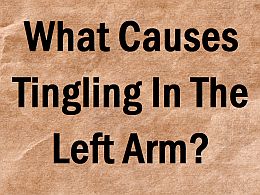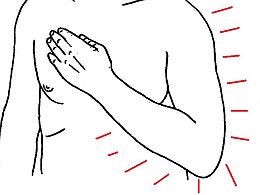Tingling in Left Arm – Is Your Left Arm Tingling and Causing Numbness?
 Tingling refers to the abnormal sensation of numbness, prickling, buzzing, vibrating or ‘pins and needles’, that occurs with or without apparent cause. This phenomenon is medically termed as “Paresthesia”. Left arm tingling can present as a symptom of many underlying diseases. Most commonly, it is due to the damage of local blood vessels or compression of the nerve supply. If your tingling left arm is worrying you, read on for a comprehensive information regarding this condition.
Tingling refers to the abnormal sensation of numbness, prickling, buzzing, vibrating or ‘pins and needles’, that occurs with or without apparent cause. This phenomenon is medically termed as “Paresthesia”. Left arm tingling can present as a symptom of many underlying diseases. Most commonly, it is due to the damage of local blood vessels or compression of the nerve supply. If your tingling left arm is worrying you, read on for a comprehensive information regarding this condition.
Tingling in Left Arm – Types of Paresthesias
The first thing you need to ascertain is how long you have been suffering from left arm numbness. Paresthesia can be broadly classified into two categories: acute and chronic. Transient acute paresthesia is when the tingling in the left arm is temporary and disappears quickly. You can compare it to the fleeting numbness you feel when you wake up after sleeping on a bent arm. As for chronic paresthesia, it is usually intermittent. If the left arm tingling comes and goes, rapidly, over a long period of time, it is chronic. Once you have figured out if the tingling in the left arm is transient or chronic, there are different diagnosis and prognosis to offer for both.
Tingling in Left Arm – Causes of Transient Paresthesia
Transient paresthesia is very common and may be caused by:
- Obdormition which causes left arm tingling due to prolonged pressure on a nerve.
- Hyperventilation which can cause tingling in the left arm due to alkaline shift in blood leading to a disturbance of the concentrations of various ions required for nerve conduction.
- Panic attacks that can get your left arm tingling in severe conditions due to a psychological effect.
- Some types of seizures like tonic-clonic seizures can lead to a tingling left arm. It can sometimes occur after a partial seizure as well.
- Dehydration resulting in around 5% water loss of the cumulative water in the body can cause a numb left arm.
- Insufficient blood supply due to constrictive clothing or being positioned in an awkward manner can also give you a tingling left arm.
- Acute arterial occlusion caused by a circulating embolus lodged in one of the main arterial supplies of the left arm can lead to severe ischemia, pallor, pain and left arm tingling as well.
Tingling in Left Arm – Causes of Chronic Paresthesia
Chronic Paresthesia can be linked to more serious neurological disease or nerve damage. These include:
- Stroke – Left arm tingling is considered a warning sign of a stroke.
- Vascular disorders – like atherosclerosis in old age damage vessel wall resulting in abnormal vasoconstriction. Less blood supply to the limb can cause tingling in the left arm.
- Nerve damage – The displacement of a vertebrae or a bulging intervertebral disc in a medical condition called Disc prolapse can cause nerve damage at the level of the nerve roots leading to a tingling left arm. Cervical spondylosis is a type of degenerative osteoarthritis which causes narrowing of the neural foramina leading to pain, muscle weakness and tingling in the left arm.
- Vitamin deficiency – Particularly of Vitamin B12 causes abnormal lipid accumulation in nerve sheaths. This nutritional deficiency can lead to a condition called peripheral neuropathy which commonly presents with the symptom of tingling in the left arm. The anemia caused by vitamin B12 deficiency further exacerbates the condition.
- Carpal Tunnel Syndrome – The median nerve which supplies the hand is compressed at the level of the wrist causing left arm tingling.
- Myocardial Infarction – A person suffering from a heart attack may also experience tingling in the left arm along with tightness in the jaw and chest. The shared dermatome for the sensory nerves of the heart is the cause of this phenomenon.
- Auto-immune diseases – Such as Rheumatoid Arthritis which involves damage of the small joints of the hand can lead to a tingling left arm.
- Metabolic diseases – Diabetes, hypothyroidism and hypoparathyroidism all lead to improper supply of nutrients to nerve cells and can be a contributing cause for tingling left arm.
Treatment for a Tingling Left Arm
 Now that you have adequate information to determine the cause of your tingling left arm, let’s consider the treatment modalities available. Bear in mind that while some of these are easy enough to do at home, you should refer to your physician before undertaking any form of self-treatment for serious conditions.
Now that you have adequate information to determine the cause of your tingling left arm, let’s consider the treatment modalities available. Bear in mind that while some of these are easy enough to do at home, you should refer to your physician before undertaking any form of self-treatment for serious conditions.
- For Vitamin deficiency, you should immediately get a blood test done to monitor the levels of Vitamin B12 in your body. If your deficiency is confirmed your physician will write a prescription for Vitamin B12. You physician will also recommend you to add Vitamin B12 rich food items like, fortified cereals, meat, fish, cheese and eggs to your diet. This will soon ease the tingling in the left arm.
- For Carpal Tunnel Syndrome, avoid postures that twist your wrist and preferably get your physician to position your wrist in a splint and advise you to do particular exercises to alleviate the tingling in the left arm.
- For Metabolic diseases like diabetes, your physician will guide you to control your blood sugar.
- If your tingling left arm is an effect of medication you are already taking, you must alert your physician about it.
- Since left arm numbness causes loss of sensation, you should take special care to avoid burns, cuts or other injuries.
- A tingling left arm caused by an auto immune disease like Rheumatoid may be treated by immunosuppressant drugs like Prednisone prescribed by your physician.
- For nerve damage causing left arm tingling due to compression, physiotherapy to halt nerve compression or nerve decompression surgery might be done.
- For vascular disorders like atherosclerosis, your doctor will prescribe drugs that cause vasodilation and lower the lipid profile of your body.
When should you see a Doctor?
As described above, a tingling sensation in the left arm can be caused by a variety of diseases. Some of these are relatively non-serious and can be taken care of at home. Nevertheless there are some instances where you should immediately seek medical attention.
- If you are able to associate the tingling in the left arm with an impending stroke or heart attack, alert the nearest person to call your local emergency number.
- If you experience weakness or are unable to move your limb along with left arm numbness, go to a hospital at once.
Likewise if you cannot control the movement of your left arm, seek immediate medical attention. - If the tingling in the left arm is accompanied by severe weakness, loss of bowel control and increased urination, you might have a seizure and lose consciousness. It is essential to go to the hospital and get medical attention in this case.
- There may be some occasions when your numb left arm may be associated with some other symptoms that you believe might just go away by themselves. However you should call up your physician to schedule a checkup:
- If you experience left arm numbness without any apparent cause.
- If the tingling begins as a result of a fall or an injury, that might have caused serious nerve damage.
- If the numbness is followed shortly by a rash.
- If you experience pain along with the numbness.
- If the tingling is accompanied with dizziness, muscle spasm or other unusual symptoms.
References:
Shapiro, Barbara E., and David C. Preston. “Entrapment and Compressive Neuropathies.” Medical Clinics of North America 93 2 (2009): 285-315. PubMed. Oh, Robert C. , and David L. Brown. “Vitamin B12 Deficiency.” American Family Physician 67 (2003): 979-986. American Academy of Family Physicians. Mar. 2003. 24 Aug. 2009 <http://www.aafp.org/afp/20030301/979.html>
Ashworth, Nigel L. “Carpal Tunnel Syndrome.” eMedicine. Eds. Benjamin M. Sucher, et al. 8 Dec. 2008. Medscape. 25 Aug. 2009 <http://emedicine.medscape.com/article/327330-overview>
Campagnola, D., et al. “Multiple Sclerosis.” eMedicine. Eds. Martin K. Childers, et al. 17 Jul. 2009. Medscape. 25 Aug. 2009 <http://emedicine.medscape.com/article/310965-overview>
Dyck, Peter J., et al., eds. “Diabetic Neuropathies: The Nerve Damage of Diabetes.” National Digestive Diseases Information Clearinghouse. Eds. Peter J. Dyck, et al. Feb. 2009. National Institute of Diabetes and Digestive and Kidney Diseases. 25 Aug. 2009 <http://diabetes.niddk.nih.gov/DM/pubs/neuropathies/index.htm#what>
Miller, Andrew, Razi M. Rashid, and Richard H. Sinert. “Guillain-Barre Syndrome.” eMedicine. Eds. Edward A. Michelson, et al. 1 Jul. 2009. Medscape. 25 Aug. 2009 <http://www.medscape.com/article/792008-overview>
Moses, Scott. “Paresthesia.” Family Practice Notebook. 10 May. 2008. 24 Aug. 2009 <http://www.fpnotebook.com/Neuro/Sensory/Prsths.htm>
http://www.nlm.nih.gov/medlineplus/ency/article/003206.htmhttp://cdn.intechopen.com/pdfs/29764/InTech-Underlying_causes_of_paresthesia.pdf
-
Advertisement

 Facebook
Facebook  Twitter
Twitter  RSS
RSS







